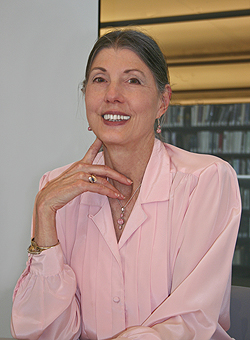By Betty Bland
Originally printed in the NOVEMBER-DECEMBER 2008 issue of Quest magazine.
Citation: Bland, Betty. "The Balancing Act." Quest 96.6 (NOVEMBER-DECEMBER 2008):204-205.

ALTHOUGH MANY FORCES, INCLUDING OUR own innate inclinations, draw us toward entering the path of spiritual growth, we can be daunted by the scary prospect before us. Who would want to walk the straight and narrow way without first having some idea of what may be entailed? It does not leave much room for error and sounds quite grueling.
The narrow way, or what has been called the razor-edged path, can be likened to a tightrope. Circus performers and other acrobats develop an amazing skill on the highwire. Their skill requires long hours of practice and a keen development of the ability to focus on the task at hand. In fact, they are so trained to the precision performance that if there is any slip it is most likely due to a momentary loss of focus. As soon as the ego whispers, "Look at me; see how great I am," the performance is at risk of going awry.
For the spiritual path as well as the tightrope performance, a clear and directed consciousness is an essential element. This kind of steady focus breathes in the rarified air of dispassionate self-forgetfulness. It is not developed in a vacuum but unfolds over time in incremental steps of increasing difficulty. To begin with, we are more like children balancing on a line or crack in the pavement. There is no risk, and it is more like a game of exploration than an actual practice. This is the stage of unconscious development. But consciousness is an amazing thing. It draws us forward as we gain control. We want to know; we want to grow. Growth begets growth.
Once there is a conscious desire for growth, we are confronted with a primary paradox of needing to develop an unshakable confidence in ourselves while cultivating a self-forgetful humility. It is no wonder that we puzzle over how we might proceed. Yet the tightrope walkers may give us a clue as to how to approach our newly developing discipline. They have to develop skills over a long series of small self-conscious efforts in training, and then they have to be able to apply those skills in such a way as to be able to perform with confidence. The small daily actions create ingrained patterns so they become effortless and a source of unselfconscious strength.
The concentrated repetition of desirable qualities results in what is called the virtuous circle. The virtues not only become habitual and strong patterns of response but they cultivate in the practitioner a growing sense of self-respect, which can result only from living in harmony with one's highest nature. And when there is a harmony between the interior Self and the lesser self of the earthly personality, the resultant sense of well-being and confidence creates understanding and motivation to strengthen the virtuous responses. Once begun, this virtuous circle brings certain growth along the spiritual path.
The fuel that jump-starts the practice of spiritually desirable qualities into this virtuous circle is a genuine concern for others and an unassuming practice of the virtues for their own sake—without concern for praise or blame from others. In fact, the resulting self-confidence has nothing to do with judgment by anyone in the outer world, but rather with the inner knowledge of one's inherent value as a spiritual being—the birthright of every human being. Yet our complex emotional/intellectual psyches continually try to draw our attention to ourselves and with that flicker of lost focus, we stumble.
In a March 28, 2008 Bill Moyers interview, Cory Booker, mayor of Newark, New Jersey, confirmed his recognition of the importance of citizens' confidence in their own self-worth as a critical factor in resurrecting the respectability of that city. Booker said, "It is a spiritual crisis of people not believing in the greatness of who we are."
The same principle is expressed in Man of La Mancha, a musical based on Cervantes' story about Don Quixote, a comical figure who sees valor and beauty where it is not visible to most others in the world. In perceiving the peasant girl Aldonza as "Lady Dulcinea," he prompts her sense of self-worth and thereby gradually transforms her attitude. By the end of the play, she embraces her newfound self-esteem by claiming the name of Dulcinea. One is left with the hope that she has entered into the aforementioned virtuous circle.
This unassuming confidence in one's inherent value and spiritual potential is a critical element for traveling the Path. In a letter of encouragement to a would-be student healer, the Master Morya writes:
So now, you my chela, choose and grasp your own destiny. (You wish to heal the sick,—do so; but remember your success will be measured by your faith—in yourself, more than in us. Lose it for a second, and failure will follow. I will give orders to Morya Junior—Olcott—to teach you the mechanical art.) Have faith in your soul power, and you will have success. (Letter 51, 2nd series)
Traversing the narrow path is an experience in balancing between self-forgetfulness and self-awareness, confidence and hubris, focused effort and sensitivity to others. This is accomplished moment by moment, day by day, as we strive to live with altruism in our hearts and with our minds attuned to the highest good. Realizing the inevitable failures and foibles that occur in the development of skills, we can have infinite patience with ourselves and others, as long as we keep our sight on the ultimate good of all. So let us explore the power of who we really are and forge ahead with an unflinching confidence that will lead us on to the goal of blessing and serving humanity. The way may be impossibly narrow and vertiginously exposed, but it provides direct feedback as we learn to toe the edge with balance and equanimity.

